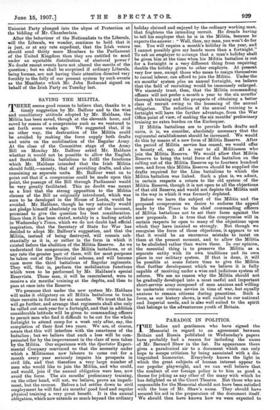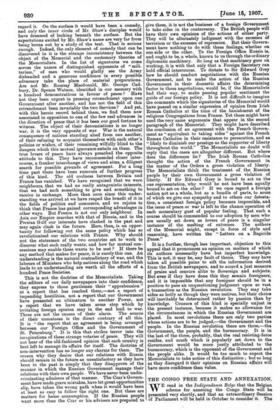PARADOX IN POLITICS.
THE ladies and gentlemen who have signed the Memorial in regard to an agreement between Britain and Russia published in Wednesday's papers have probably had a reason for including the name of Mr. Bernard Shaw in the list. Its appearance there gives a paradoxical air to a document which can only hope to escape criticism by being associated with a dis- tinguished humourist. Everybody knows the light in which the great subjects of human interest appear to our popular. playwright, and we can well believe that the conduct of our foreign policy is to him as good a theme for joking as any other of the many with which he has delighted us at the Court Theatre. But those who are responsible for the Memorial should not have been satisfied with the loan of Mr. Shaw's name. They should have secured his aid in the preparation of the document itself. We should then have known how we were expected to regard it. On the surface it would have been a comedy, and only the inner circle of Mr. Shaw's disciples would have dreamed of looking beneath the surface. But the expectations excited by Mr. Shaw's name are very far from being borne out by a study of the text. That is serious enough. Indeed, the only element of comedy that can be discovered in it is the strange inconsistency between the object of the Memorial and the customary theories of the Memorialists. In the list of signatures we come across the names of distinguished opponents of "mili- tarism," of men who would gladly see the Army disbanded and a generous confidence in every possible adversary take the place of material preparations. Are not Mr. Ramsay Macdonald, Mr. George Cad- bury, Dr. Spence Watson, identified in our memory with a hundred demonstrations in favour of peace ? Have not they been urgent in pressing retrenchment upon one Government after another, and has not the field of this retrenchment been invariably the two Services ? And yet, with this heroic record behind them, we find them now associated in opposition to one of the few real advances in the direction of peace that it has been our good fortune to witness. The object of their denunciations is no longer war, it is the very opposite of war. War is the natural consequence of nations standing aloof from one another, of their refusing to acquaint themselves with each other's policies or wishes, of their remaining wilfully blind to the dangers which this mutual ignorance entails on them. The true lovers of peace have always preached the opposite attitude to this. They have recommended closer inter- course, a franker interchange of views and aims, a diligent search for poasible grounds of agreement. For a long time past there have been rumours of fnrther progress of this kind. The old coolness between Britain and France has vanished. We have recognised that we were neighbours, that we had no really antagonistic interests, that we had each something to give and something to receive in exchange. More than once sine,e this under- standing was arrived at we have reaped the benefit of it in the fields of politics and commerce, and we rejoice to think that France has gained corresponding advantages in other ways. But France is not our only neighbour. In Asia our Empire marches with that of Russia, and in the Persian Gulf our interests have clashed in the past and may again clash in the future. Here, then, is an oppor- tunity for following out the same policy which has so revolutionised our relations with France. Why should not the statesmen of the two countries set to work to discover what each really wants, and how far mutual con- cessions may enable these wants to be met ? If there be any method that makes for peace, it is surely this one. An understanding is the natural contradictory of war, and the labours of Ministers who help nations along the road which leads to an understanding are worth all the efforts of a hundred Peace Societies.
This is not the doctrine of the Memorialiets. Taking the editors of our daily newspapers into their confidence, they express to those gentlemen their " apprehension " at a report that has reached them,—not a report of impending hostilities, not a report that our Government have presented an ultimatum to another Fower, not a. report that we have taken some step which by irritating foreign opinion may in the end lead to war. These are not the causes of their alarm. The source of their uneasiness is the direct contrary of all this. It is "the report that an agreement is being arranged between our Foreign Office and the Government of St. Petersburg." It is this that strikes terror into the imaginations of these strange votaries of peace. They will not hear of the old-fashioned opinion that each country is best left to manage its affairs for itself. The doctrine of non-intervention has no longer any charms for them. The reason why they desire that our relations with Russia should remain in the future as unsatisfactory as they have been in the past is simply that they disapprove of the manner in which the Russian Government manage their relations with their own people. We have never been undis- criminating admirers of that manner. The Czar's Govern- ment have made grave mistakes, have let great opportunities slip, have taken the wrong path when it would have been at least as easy to follow the right one. But these are matters for home consumption. If the Russian people want more than the Czar or his advisers are prepared to
give them, it is not the business of a foreign Government to take sides in the controversy. The British people will have their own opinions of the actions of either party. They will be alternately indignant with the excesses of terrorism or the excesses of repression. But their Govern- ment have nothing to do with these feelings, whether on one side or the other. To the Foreign Office Russia is, and ought to be, a whole, known to us through the ordinary diplomatic machinery. So long as that machinery goes on working, it is with that only that a Foreign Secretary can hold official intercourse. To dictate to Sir Edward Grey how he should conduct negotiations with the Russian Government, and to make the action of the Russian Government in their domestic affairs the determining factor in those negotiations, would be, if the Memorialists had their way, to make passing popular sentiment the guide of our foreign policy. It is not difficult to imagine the comments which the signatories of the Memorial would have passed on a similar expression of opinion from Irish Roman Catholics at the time of the banishment of the religious Congregations from France. Yet these might have used the very same arguments that appear in the second paragraph of the Memorial. They might have described the conclusion of an agreement with the French Govern- ment as "equivalent to taking sides" against the French Roman Catholics in their resistance to persecution, and as "likely to diminish our prestige as the supporter of liberty throughout the world." The Memorialists no doubt will reply that the cases are altogether different. But where does the difference lie ? The Irish Roman Catholics thought the action of the French Government in the matter of the Orders a gross violation of liberty. The Memorialists think the treatment of the Russian people by their own Government a gross violation of liberty. If Sir Edward Grey is bound to act on the one representation, why would he not have been equally bound to act on the other ? If we once regard a, foreign nation not as a whole, but as a bundle of parte, to some of which we give our sympathy and to others our detesta- tion, a consistent foreign policy becomes impossible, and the issue of peace or war is left to the chant* operation of each momentary gust of popular feeling. That such a course should be commended to our adoption by men who are usually set down as lovers of peace is a singular instance of the malting of extremes. The authors of the Memorial might, except in force of style and reasoning, have written the "Letters on a Regicide Peace."
It is a further, though less important, objection to this appeal that it pronounces an opinion on matters of which its authors necessarily have but imperfect knowledge. This is not; it may be, any fault of theirs. They may have taken all possible pains to sift the information derived from the British newspapers, and to accord a just measure of praise and censure alike to Sovereign and subjects. But even if they have done this they memain foreigners, and it is impossible that any foreigner should be in a position to pass an unquestioning judgment upon so vast a transaction as the Russian revolution. They may take sides as hotly as though they were natives, but their choice will inevitably be determined rather by passion than by knowledge. Censure of this kind is specially unjust in the present instance, because it makes no allowance for the circumstances in which the Russian Government are placed. In most revolutions there are only two partial whose actions are to be judged,—the Government and the people. In the Russian revolution there are three,—the Government, the people, and the bureaucracy. It is in the last of the three, probably, that the real resisting-force resides, and much which is popularly set down to the Government would be more justly attributed to the bureaucracy, which is the opponent of the Government and the people alike. It would be too much to -expect the Memorialists to take notice of this distinction ; but so long as they disregard it their opinions on Russian affairs will have more confidence than value.







































 Previous page
Previous page